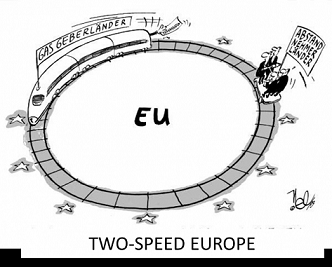Meyer, H. (2014) “Why European Progressives Stick To Austerity“, Social Europe Journal, 01 September. Writing about the recent French government crisis in the New York Times, Paul Krugman raised some uncomfortable questions. He worried about the ongoing dominance of austerity illogic on this side of the Atlantic and what this says about public discourse and the effectiveness of progressive forces. He criticised the UK Labour Party for its unwillingness …Read More
Europe According to Draghi
Pisani-Ferry, J. (2014) “Europe According to Draghi“, Project Syndicate, 31 August. Central bankers are often proud to be boring. Not Mario Draghi. Two years ago, in July 2012, Draghi, the president of the European Central Bank, took everyone by surprise by announcing that he would do “whatever it takes” to save the euro. The effect was dramatic. This August, he used the annual gathering of top central bankers in …Read More
A missed opportunity
Sonntag, A. (2014) “A missed opportunity“, EU-Asia Institute at ESSCA School of Management, 01 September. 20 years ago, on the 1st of September 1994, two German MPs from the CDU led by Helmut Kohl published a position paper, which bore the innocuous title ‘Reflexions on European Politics’ and which became quickly named the ‘Schäuble-Lamers Paper’ after its authors. The propositions and recommendations formulated in this rather dense document of …Read More
Fixing Europe’s Orbán Problem
Brenner, T. & Reinicke, W. (2014) “Fixing Europe’s Orbán Problem“, Social Europe Journal, 26 August. In April, when German Chancellor Angel Merkel congratulated Hungarian Prime Minister Viktor Orbán on his reelection, she let it be known that his large majority implied a “special responsibility” to use good judgment and behave with sensitivity toward opponents. He has done exactly the opposite. Indeed, Orbán has consistently defied the European Union’s core values and …Read More
Mario Draghi At Jackson Hole
Wren-Lewis, S. (2014) “Mario Draghi At Jackson Hole“, Social Europe Journal, 26 August. To understand the significance of yesterday’s speech (useful extract from FT Alphaville here), it is crucial to know the background. The ECB has appeared to be in the past a centre of what Paul De Grauwe calls balanced-budget fundamentalism. I defined this as a belief that we needed fiscal consolidation (austerity) even when we were in a liquidity trap (i.e. interest rates were …Read More
Europe’s Fitful Financial Integration
Davies, H. (2014) “Europe’s Fitful Financial Integration“, Project Syndicate, 25 August. The well-publicized troubles of Portugal’s Banco Espírito Santo this summer have reminded us that the eurozone’s financial problems are by no means resolved. There are, no doubt, idiosyncratic factors behind the bank’s problems, stemming from its exposure to other parts of the Espírito Santo family’s empire. But when the bank announced a first-half loss of €3.6 billion ($4.7 …Read More
Eurozone has failed – a major shift in direction is needed
Mitchell, B. (2014) “Eurozone has failed – a major shift in direction is needed“, Bill Mitchell Blog, 25 August. The central bankers of the World met at Jackson Hole, Wyoming last week for their annual gathering far from the madding crowd. And as far away from the mess they have helped to create as you could imagine. Out of sight out of mind I guess. The ECB boss felt …Read More
A European Lost Decade?
Heise, M. (2014) “A European Lost Decade?“, Project Syndicate, 22 August. Europe is in a difficult predicament. Inflation has fallen to 0.4%, and economic growth has been anemic for years. Though the European Central Bank has kept interest rates close to zero, private credit growth is stalling and public debt continues to rise. This sounds a lot like Japan’s situation in the 1990s, which culminated in a “lost decade” …Read More
Can Investment Save Europe?
Pisani-Ferry, J. (2014) “Can Investment Save Europe?“, Project Syndicate, 30 July. Economic growth in Europe remains disappointing. Virtually all European Union members are expected to post higher output in 2014; but, according to the International Monetary Fund’s latest projections, the average growth rate in the eurozone will barely exceed 1%. And, whereas the British economy is displaying strong momentum, its GDP has only now surpassed the pre-crisis mark. In …Read More
The Real Raw Material of Wealth
Hausmann, R. (2014) “The Real Raw Material of Wealth“, Project Syndicate, 26 July. Poor countries export raw materials such as cocoa, iron ore, and raw diamonds. Rich countries export – often to those same poor countries – more complex products such as chocolate, cars, and jewels. If poor countries want to get rich, they should stop exporting their resources in raw form and concentrate on adding value to them. …Read More





